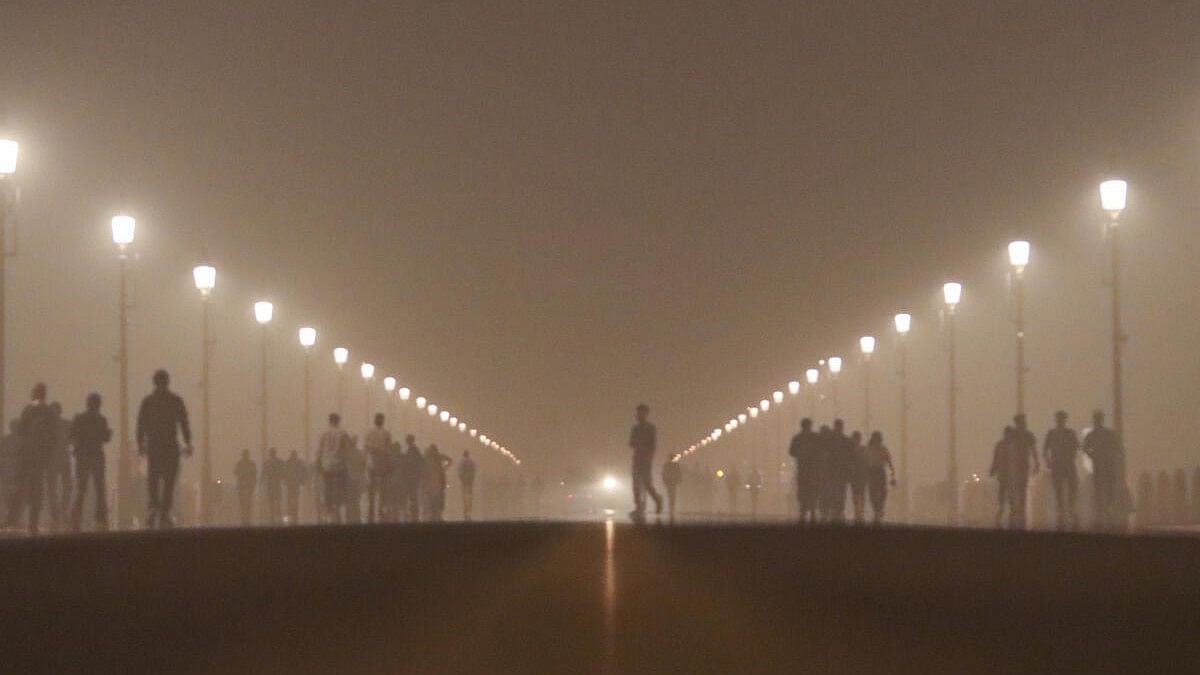
Air pollution in Delhi.
Credit: PTI photo
New Delhi: With the air quality in the national capital becoming severe, the Supreme Court on Monday said it will not allow the scaling down of the preventive measures against pollution in Delhi without its prior permission.
The court declared the implementation of GRAP 4 restrictions will continue even if AQI level drops below 450 and asked the Delhi-NCR states to immediately set up teams to enforce anti-air pollution restrictions, including stopping of physical classes upto class 12.
It also directed the Centre to involve ISRO and collect data from Stationary Korean Satellite, instead of polar orbiting ones on farm fires from neighbouring states.
A bench of Justices Abhay S Oka and Augustine George Masih also emphasised that it is the constitutional obligation of central and state governments to ensure citizens live in pollution free atmosphere, and criticised the Commission for Air Quality Management (CAQM) for adopting a "completely wrong approach", as it decided to wait for improvement in AQI levels, which delayed the implementation of stage 3 and stage 4 of Graded Response Action PIan (GRAP).
Hearing the matter related to air pollution, the court asked the Centre to make immediate arrangements for getting data from either Korean stationery satellites or any other stationery satellites so that data of stubble burning throughout the day can be made available. The bench said this data will enable states to take immediate actions.
The court also said that the commission and Centre should also involve ISRO in taking this step so that all instances of farm burning, during the day can be reported to the concerned states.
Earlier, the bench came down heavily upon the Delhi government over the delay in the implementation of stage 4 of the Graded Response Action Plan (GRAP)."How can you take risk in these matters by delaying the applicability of stage 4 of GRAP," the bench asked the Delhi government counsel.
The bench said the delay occurred even after the air quality index (AQI) touched alarming levels in the national capital.
The court noted the AQI crossed 400 on November 12, GRAP-3 was implemented only from November 14. GRAP-4 was enforced only with effect from Monday, though the AQI crossed 450 on Sunday.
The bench also felt CAQM was supposed to take preventive measures instead of waiting for the air quality to worsen.
The Delhi government counsel informed that bench that from Monday onwards, stage 4 of GRAP had been implemented. The counsel said that heavy vehicles have been banned from entering the national capital.
“The moment the AQI reaches between 300 and 400, stage 4 has to be invoked. How can you take risk in these matters by delaying applicability of stage 4 of GRAP,” the bench told the counsel.
The bench asked the counsel to apprise it of steps taken to curb air pollution levels.
"We won’t allow scaling down of preventive measures under stage 4 even if AQI goes below 450. Stage 4 will continue till court permits," the bench said.
On Sunday, the CAQM announced stricter pollution control measures for the Delhi-NCR under GRAP-4, effective from 8 am on Monday, including a ban on truck entry and a temporary halt on construction at public projects.
The Commission for Air Quality Management (CAQM) issued the order as Delhi's Air Quality Index (AQI) worsened, reaching 441 at 4 pm and rising to 457 by 7 pm due to unfavourable weather conditions.
The court had decided to take up on November 18, a plea for enforcement of measures to check pollution in the capital, after it was informed that Delhi should not become the most polluted city in the world.
